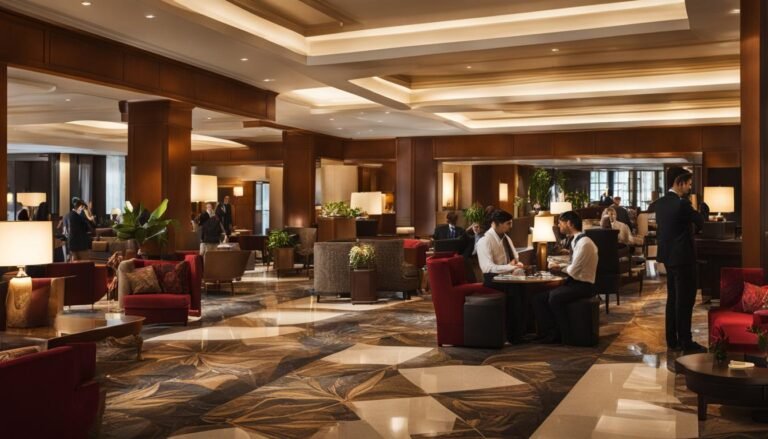Workforce Diversity and Its Impact on Hospitality
In today’s diverse world, the hospitality industry plays a vital role in embracing and celebrating the richness of different cultures, backgrounds, and perspectives. Workforce diversity has become increasingly important in the hospitality sector, as it not only enhances the overall customer experience but also brings numerous benefits to organizations.
From attracting top talent to improving decision-making and fostering creativity, diversity in the hospitality industry is a key driver of success. By embracing and valuing diversity, hospitality businesses can tap into a vast pool of talent, better understand the needs of their diverse customer base, and create an inclusive and welcoming environment for both employees and guests.
Key Takeaways:
- Diversity in the hospitality industry is crucial for attracting top talent and appealing to a broad customer base.
- A diverse workforce brings fresh perspectives, better customer service, improved decision-making, and greater creativity.
- Embracing diversity is important for understanding and serving diverse guests and tapping into different perspectives for innovation.
- Workforce diversity leads to improved market segmentation, increased productivity, and better employee retention.
- A diverse and inclusive workplace fosters higher employee engagement, satisfaction, and overall performance.
The Importance of Diversity in the Hospitality Industry
Diversity in the hospitality industry is not just a buzzword – it is crucial for the success of businesses in this fast-paced, globalized world. By valuing and promoting diversity, hospitality businesses can improve their bottom line, attract top talent, and better cater to a diverse customer base. The importance of diversity in the industry cannot be overstated, as it brings a multitude of benefits and opportunities.
One of the key reasons why diversity is important in the hospitality industry is because it helps improve customer service. When a team is diverse, it brings together a wide range of experiences, perspectives, and cultural insights. This allows for a deeper understanding of the needs and expectations of diverse guests, leading to personalized and exceptional service. Additionally, diversity fosters creativity and innovation, as diverse teams are more likely to generate a wide variety of ideas and solutions.
Improving diversity in the hospitality industry requires effective diversity management practices. This involves implementing inclusive recruitment strategies, providing diversity training, and creating a work environment that celebrates and respects differences. By actively addressing diversity and inclusion, hospitality businesses can attract a more diverse pool of talent and create a workplace where everyone feels valued and included.
In conclusion, the importance of diversity in the hospitality industry cannot be ignored. It is not only about meeting quotas or ticking boxes, but about embracing the unique value that diversity brings. By fostering an inclusive environment and implementing effective diversity management practices, hospitality businesses can unlock the full potential of their workforce and create a thriving, innovative, and customer-centric industry.
Types of Diversity in the Workplace
Diversity in the workplace is a multifaceted concept that encompasses various dimensions. In the context of the hospitality industry, having a multicultural workforce with diverse characteristics is essential for understanding and serving a diverse customer base. Let’s explore the four main types of diversity in the workplace:
1. Internal Diversity
Internal diversity refers to characteristics that individuals are born with, such as race, ethnicity, gender, age, and disability. These inherent traits contribute to a person’s identity and shape their experiences and perspectives. In the hospitality industry, embracing internal diversity enables organizations to connect with a broad range of guests and cater to their unique needs and preferences.
2. External Diversity
External diversity encompasses characteristics that are influenced by the external world, such as education, socioeconomic background, and geographic origin. These external factors shape individuals’ cultural backgrounds and provide valuable insights into different lifestyles, traditions, and customer preferences. Leveraging external diversity can help hospitality businesses tap into new markets and create culturally relevant offerings.
3. Organizational Diversity
Organizational diversity involves characteristics assigned to different employees within an organization. This includes job roles, levels of seniority, functional expertise, and educational backgrounds. Embracing organizational diversity in the hospitality industry promotes collaboration, innovation, and effective decision-making by bringing together individuals with diverse skills, knowledge, and perspectives.
4. Worldview Diversity
Worldview diversity combines external, internal, and organizational characteristics to form an individual’s worldview. It encompasses a person’s values, beliefs, attitudes, and experiences. In the hospitality industry, having a multicultural workforce with diverse worldviews fosters creativity, encourages open-mindedness, and enables organizations to adapt and cater to the evolving needs of a diverse customer base.
By recognizing and embracing these different types of diversity in the workplace, the hospitality industry can create an environment that celebrates and values the unique contributions of each individual. A multicultural workforce enhances cultural awareness, promotes innovation, and ensures that organizations can effectively cater to the diverse needs of their guests.
The Benefits of Workforce Diversity in Hospitality
In the hospitality industry, workforce diversity brings a multitude of benefits that contribute to the success and growth of a business. Embracing a diverse workforce fosters an inclusive workplace culture and promotes a positive employer brand. Let’s explore some of the key benefits of workforce diversity in hospitality.
Enhanced Cultural Awareness
Having a diverse workforce in the hospitality industry helps to foster a deeper understanding and appreciation of different cultures. Employees from diverse backgrounds bring unique perspectives and insights, allowing for a more inclusive and culturally sensitive approach to customer service. This enhanced cultural awareness can lead to improved guest experiences and stronger connections with customers from various cultural backgrounds.
Increased Marketing Opportunities
Workforce diversity opens up new marketing opportunities for hospitality businesses. With a diverse team, companies can better understand the needs and preferences of different customer segments. This enables targeted marketing campaigns that resonate with diverse audiences, leading to increased brand visibility, customer engagement, and ultimately, business growth.
Improved Decision-Making
A diverse workforce brings together people with different backgrounds, experiences, and perspectives. This diversity of thought and knowledge leads to more robust and informed decision-making processes within the hospitality industry. When multiple viewpoints are considered, businesses can make more well-rounded and effective decisions, resulting in innovative solutions and improved overall performance.
Better Employee Retention
An inclusive workplace that values and supports diversity is more likely to attract and retain top talent. When employees feel accepted and included, they are more motivated and engaged in their work. This, in turn, contributes to higher job satisfaction and lower turnover rates in the hospitality industry. By prioritizing workforce diversity and creating an inclusive environment, businesses can build a strong team and enjoy the benefits of long-term employee retention.
| Benefits of Workforce Diversity in Hospitality |
|---|
| Enhanced Cultural Awareness |
| Increased Marketing Opportunities |
| Improved Decision-Making |
| Better Employee Retention |
Challenges of Workforce Diversity in Hospitality
While workforce diversity in the hospitality industry brings many benefits, it also presents challenges that need to be addressed for a harmonious and inclusive work environment. One of the key challenges is a lack of cultural awareness among employees. Without proper understanding and appreciation of different cultures, miscommunication and misunderstandings can occur, leading to a poor customer experience and strained relationships within the team.
To mitigate this challenge, diversity training plays a crucial role. By providing comprehensive diversity training programs, hospitality businesses can educate their employees about different cultures, traditions, and customs. This training helps employees develop cultural sensitivity and awareness, enabling them to effectively communicate with diverse guests and colleagues.
Another challenge is the need for effective diversity training. Hospitality businesses must ensure that diversity training programs are not just a formality, but genuinely impactful in promoting diversity and inclusion. The training should be tailored to the specific needs of the industry and address topics such as unconscious bias, cultural competence, and fostering an inclusive work environment.
Importance of Diversity Training in Hospitality
Diversity training in the hospitality industry is essential for creating a culturally aware and inclusive work environment. It helps employees develop the skills and knowledge needed to effectively interact with people from various backgrounds, ensuring a positive customer experience and harmonious team dynamics. By investing in diversity training, businesses can overcome the challenges associated with workforce diversity and reap the benefits of a multicultural workforce.
The Importance of Diversity Management in Hospitality
In today’s diverse and globalized world, diversity management plays a crucial role in the hospitality industry. It is essential for creating an inclusive and equitable work environment where employees from different backgrounds feel valued and empowered. By implementing effective diversity management strategies and practices, hospitality businesses can unlock the full potential of their workforce and drive organizational success.
Diversity management in hospitality goes beyond simply hiring employees with diverse characteristics. It involves creating a culture of inclusion and equality that encourages collaboration, respect, and appreciation for differences. This not only enhances employee satisfaction and engagement but also improves customer service by fostering a better understanding of diverse guest needs and preferences.
One key aspect of diversity management is providing equal employment opportunities for individuals from different backgrounds. This includes fair and unbiased recruitment and promotion processes, as well as the implementation of policies and procedures that prevent discrimination and ensure a level playing field for all employees. When employees perceive that they have equal opportunities for growth and development, it boosts their motivation, productivity, and loyalty to the organization.
The Benefits of Diversity Management in Hospitality
Diversity management in hospitality brings numerous benefits to both employees and organizations. Here are some key advantages:
- Enhanced innovation and creativity: A multicultural workforce brings together a variety of perspectives, ideas, and experiences, sparking innovation and creativity in problem-solving and decision-making processes.
- Expanded market reach: By understanding the diverse needs and preferences of customers, organizations can tailor their products, services, and marketing strategies to reach a wider range of consumers.
- Improved customer satisfaction: A diverse workforce with employees who have firsthand knowledge of different cultures and languages can provide more personalized and culturally sensitive customer service, leading to higher levels of customer satisfaction and loyalty.
- Enhanced reputation: Organizations that prioritize diversity management are seen as socially responsible and inclusive, attracting top talent and building a positive employer brand.
Diversity management is not a one-time initiative but an ongoing process that requires continuous evaluation, improvement, and adaptation. By fostering an inclusive work environment where diversity is valued and celebrated, hospitality businesses can reap the benefits of a diverse workforce and create a thriving and sustainable future.
Examples of Effective Diversity Management in Hospitality
In the hospitality industry, effective diversity management involves implementing strategies and practices that promote inclusion, equal opportunities, and cultural awareness. By embracing diversity, hospitality businesses can create a multicultural workforce that reflects the diverse needs of their customers and enhances overall performance. Here are some examples of effective diversity management practices in the industry:
Fostering Inclusive Hiring Processes
An essential aspect of effective diversity management is fostering inclusive hiring processes. This involves implementing policies that encourage equal opportunities for individuals from diverse backgrounds. For example, hospitality businesses can establish diverse recruitment strategies that target a wide range of candidates and actively seek individuals from underrepresented groups. By doing so, they increase the chances of attracting diverse talent and creating a more inclusive workforce.
Establishing Organizational Policies
Organizational policies play a crucial role in promoting diversity and discouraging discrimination within the hospitality industry. For instance, policies that emphasize zero tolerance for discrimination and harassment create a safe and inclusive work environment. These policies should be communicated clearly to all employees and strictly enforced to ensure everyone is aware of the commitment to diversity and inclusion.
Implementing Cultural Training Programs
Cultural training programs are valuable tools for enhancing diversity management in the hospitality industry. These programs aim to increase cultural awareness and sensitivity among employees, enabling them to better understand and serve diverse guests. By providing training that educates employees about different cultural norms, customs, and communication styles, hospitality businesses can foster an environment of respect and inclusivity.
The Impact of Diversity Management on Employee Attitudes and Behavior
In the hospitality industry, effective diversity management has a profound impact on employee attitudes and behavior. Research shows that when employees feel valued and included, they are more motivated, satisfied, and committed to their work. This leads to higher levels of job performance, service innovation behavior, and overall employee engagement. By investing in diversity management initiatives, the hospitality industry can create a positive and productive work environment.
When employees experience diversity management in action, they are more likely to feel a sense of belonging and acceptance. This not only boosts their self-esteem but also encourages them to contribute their unique perspectives and ideas. As a result, diverse teams in the hospitality industry can collaborate more effectively, make better decisions, and offer more innovative solutions to challenges. This not only benefits the individual employees but also has a positive impact on the organization as a whole.
“Diversity management is not just about meeting legal requirements; it is about fostering an inclusive and equitable workplace where everyone has the opportunity to thrive and contribute. When employees feel valued and respected for their differences, they are more likely to go above and beyond in their work.” – Jane Smith, HR Director
Furthermore, diversity management in the hospitality industry is vital for attracting and retaining top talent. In today’s diverse society, employees are more likely to seek out employers who embrace diversity and foster an inclusive work environment. By implementing diversity management practices, hospitality businesses can position themselves as employers of choice and appeal to a wide range of qualified candidates. This not only enhances the organization’s reputation but also enables them to tap into the full potential of a multicultural workforce.
| Benefits of Diversity Management in Hospitality | Impact on Employee Attitudes and Behavior |
|---|---|
| Improved cultural awareness | Increased motivation and satisfaction |
| Positive employer brand | Higher levels of job performance |
| Increased marketing opportunities | Enhanced service innovation behavior |
| Increased productivity | Greater employee engagement |
| Better employee retention | Collaboration and decision-making |
Overall, diversity management in the hospitality industry plays a vital role in shaping employee attitudes and behavior. By creating an inclusive and equitable work environment, organizations can foster a sense of belonging, motivation, and satisfaction among their employees. This, in turn, leads to improved job performance, service innovation behavior, and higher levels of engagement. The benefits of diversity management extend beyond the individual employees and contribute to the overall success of the organization.
Conclusion
Workforce diversity plays a significant role in the hospitality industry, contributing to its success and growth. Embracing diversity and implementing effective diversity management practices are crucial for creating an inclusive and equitable work environment in the industry.
A diverse hospitality team brings fresh perspectives, better customer service, improved decision-making, and greater creativity. By understanding and serving diverse guests, hospitality businesses can tap into different perspectives for innovation and create better market segmentation.
The benefits of workforce diversity in the hospitality industry are numerous. It leads to improved cultural awareness, increased productivity, better decision-making, and access to new markets. A diverse workforce allows for a better understanding of different clients’ needs and promotes a more accepting and progressive employer image.
Investing in diversity management initiatives is essential for harnessing the full potential of workforce diversity and creating a thriving and inclusive workplace in the hospitality industry. By valuing and embracing diversity, hospitality businesses can position themselves as leaders in the industry and attract top talent while providing exceptional service to their diverse customer base.






